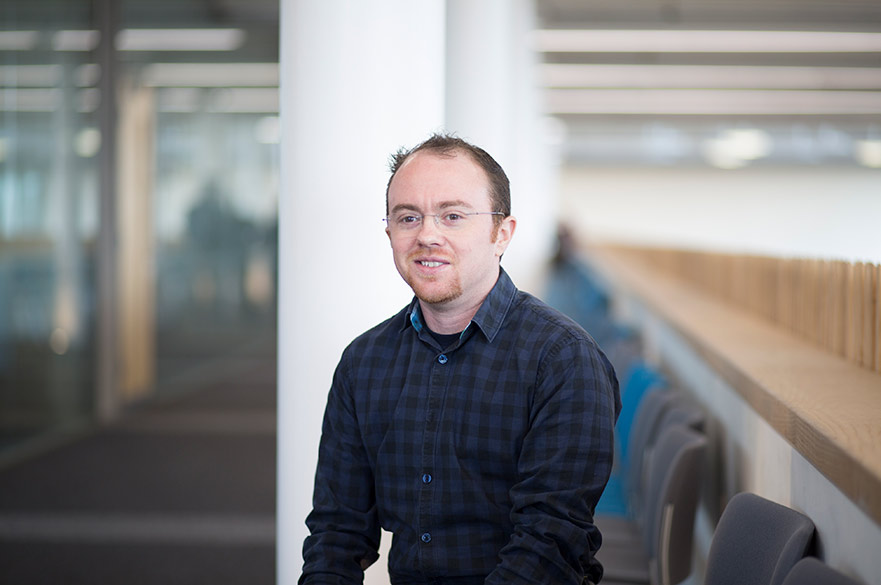Role
Dr Addicoat is an Independent Research Fellow in Functional Materials.
He teaches on the following modules:
- CHEM10121 Professional Development: Introduction to Scientific Programming in Python
- CHEM10181 Introduction to Physical Chemistry: Thermodynamics
- CHEM20291 Physical Chemistry: Thermodynamics
- CHEM40281 Computational Chemistry and Drug Design
Career overview
- Post-doctoral Research Fellow, Universität Leipzig, 2016
- Marie Curie International Incoming Fellow, Jacobs University, 2013 - 2015
- Japan Society for the Promotion of Science Postdoctoral Research Fellow, Nagoya University 2010 - 2012
- Post-doctoral Research Fellow, Australian National University, 2008 - 2010
- PhD, University of Adelaide, 2004 - 2009
Research areas
Dr. Addicoat’s research interests lie in computational combinatorial chemistry – that is using computer calculations to search and sort many thousands or even millions of possible chemical compounds, before any of them are synthesised. In particular, Dr. Addicoat is interested in applying these methods to materials chemistry, where the following three types of materials are of current interest:
- Molecular Framework Materials – Molecular Framework Materials, such as Metal Organic Frameworks (MOFs), Covalent Organic Frameworks (COFs) and Zeolitic Imidazolate Frameworks (ZIFs) are highly porous materials made by stitching together various metal or organic “nodes” (corners) with organic “linkers” (edges) to create 2D and 3D frameworks. These materials typically have high surface area, tuneable pore size and changeable functional groups leading to possible applications in fields such as gas adsorption and separation, catalysis and sensing. Given the hundreds of different networks and the effectively infinite number of molecules that can be used to create a framework material, identifying the optimum framework by chance is highly unlikely.
- Ionic Liquids – Ionic liquids (ILs) are liquids comprised entirely of ions, differentiated from typical ionic salts by having melting points below 100 oC. IL melting points are low because electrostatic interactions between component ions are weaker, and crystal lattice packing is hindered. This is typically achieved by making at least one of the ions large, unsymmetrical and organic. The physicochemical properties of ILs can be tuned through a judicious choice of ions. This flexibility has driven wide-ranging research into their use as solvents in green chemistry, energy and electrochemical applications, pharmaceuticals and lubricants.
- Transition Metal Clusters – Small clusters of transition metal atoms in the sub-nanometre range have been shown to catalyse a number of environmentally important reactions – e.g. the oxidation of CO and reduction of NO. However, the properties of these clusters are very difficult to predict, and adding or subtracting a single atom can change the reaction rates by several orders of magnitude.
Code:
Dr. Addicoat is the author of the following software:
Sponsors and collaborators
Dr. Addicoat collaborates with several theoretical and experimental groups including:
Prof. Donglin Jiang (JAIST, Japan)
Prof. Rahul Banerjee (NCL, Pune, India)
Dr. Manuel Tsotsalas (KIT, Germany)
Publications
Extension of the universal force field for metal-organic frameworks. Coupry DE, Addicoat MA, Heine T, Journal of Chemical Theory and Computation, 2016, 12 (10), 5215-5225
Multiple-component covalent organic frameworks. Huang N, Zhai L, Coupry DE, Addicoat MA, Okushita K, Nishimura K, Heine T, Jiang D, Nature Communications 7, 2016, 12325
AuToGraFS: Automatic topological generator for framework structures. Addicoat Ma, Coupry DE, Heine T, The Journal of Physical Chemistry A, 2014, 118 (40), 9607-9614
Assessment of the Density Functional Tight Binding Method for Protic Ionic Liquids. Addicoat Ma, Stefanovic R, Webber GB, Atkin R, Page AJ, Journal of Chemical Theory and Computation, 2014, 10 (10), 4633-4643
Extension of the universal force field to metal-organic frameworks. Addicoat MA, Vankova N, Akter IF, Heine T, Journal of Chemical Theory and Computation, 2014, 10 (2), 880-891
Stochastic structure determination for conformationally flexible heterogenous molecular clusters: application to ionic liquids. Addicoat MA, Fukuoka S, Page AJ, Irle S, Journal of Computational Chemistry, 2013, 34 (30). 2591-2600
The fragment molecular orbital and systematic molecular fragmentation methods applied to water clusters. Pruitt SR, Addicoat MA, Collins MA, Gordon MS, 2012, Physical Chemistry Chemical Physics, 2012, 14 (21), 7752-7764
Optimization of a genetic algorithm for searching molecular conformer space. Brain ZE, Addicoat MA, The Journal of Chemical Physics, 2011, 135 (17), 174106
